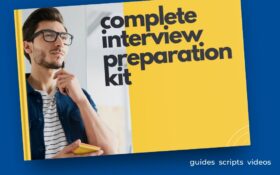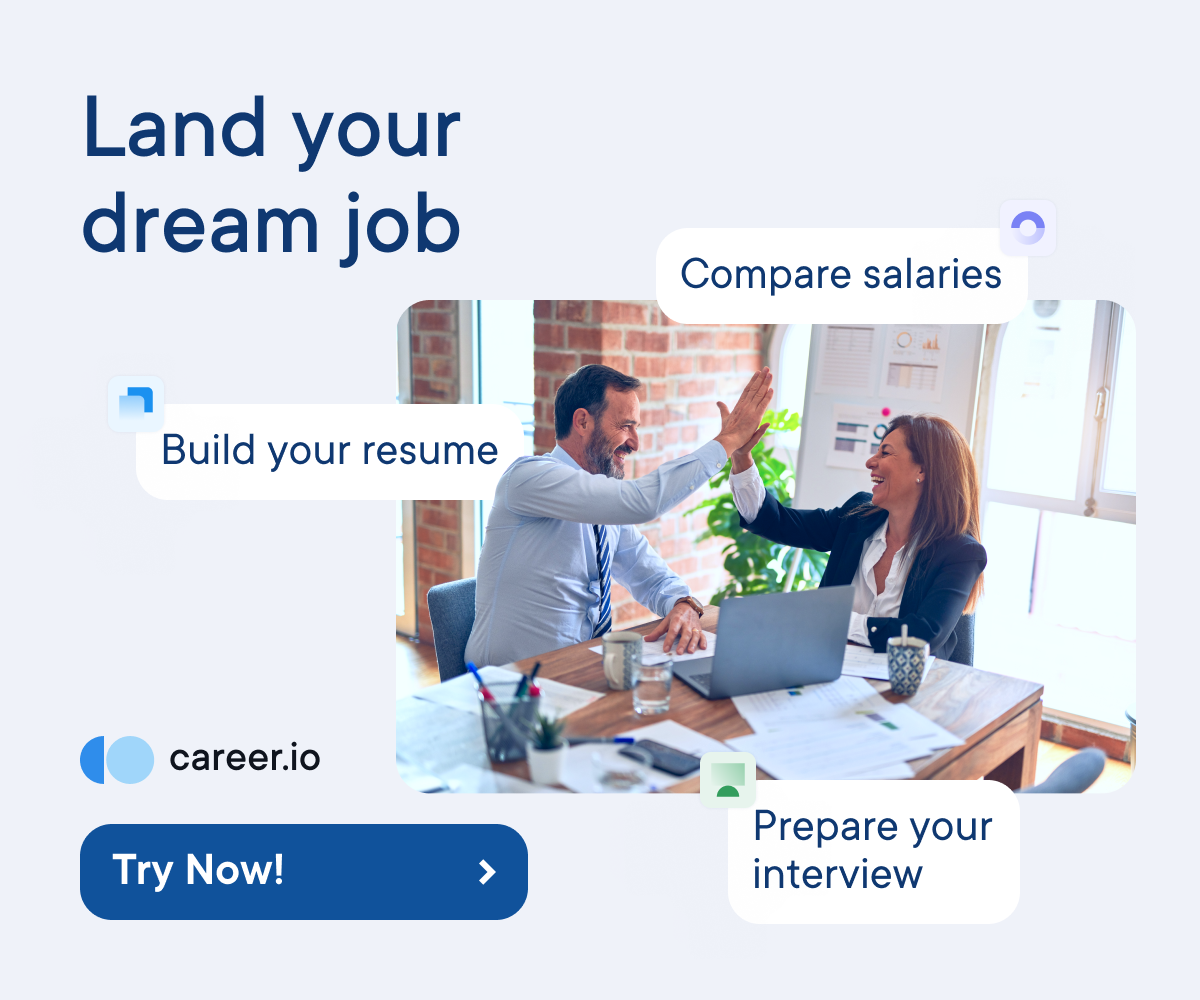
At the end of a job interview most candidates expect to get asked “do you have any questions for us?” At the very least, asking a few questions shows that you’re interested in the role.
But don’t waste your time asking the same generic questions that every candidate is going to ask. This won’t help you to stand out, nor will it give the insight that you need to make a decision.
I’m going to share examples of the questions that you should be prepared to ask during your next job interview.
The 5 most important questions to ask in a job interview
There are five categories of questions that we’re going to explore. I’m going to give you 10 example questions for each category.
1. Role
2. Organization
3. Team
4. Expectations
5. Process
Save this page in your bookmarks and return to it each time you prepare for a job interview. Select 4-5 questions, questions that you feel will provide you with the greatest insight.
Why ask questions in an interview?
There are a few good reasons for asking questions during an interview. The most obvious reason is that you’re expected to. But this isn’t the only reason, and it’s not the most important one. Here are four good reasons to ask questions in your interview.
To put your mind at ease
You’re going to have doubts about the organisation and role that you are interviewing for. It would be strange if you didn’t. Asking questions at the end of an interview will help to clear up some of these concerns.
Show preparation
Frame the question in the right way and you’ll impress them with your level of research. Clarify something you read online, in the press or heard in the market.
Buy yourself time to think
You don’t have to save all your questions until the end of the interview. You can work some questions into the conversation. This can help you gain clarity or give you a much-needed break during the interview.
Deepen your knowledge of the opportunity
Questions help you to build up a better picture of the opportunity on offer. Asking questions during interviews is essential to making a well-informed decision.
What questions should you ask in an interview?
Let’s return to our five categories of questions and look at them each in turn. I’ll give you 10 examples for each category. These examples are for you to take and adapt for your personal use.
1. Ask questions about the role that you’re interviewing for
Asking questions about the role is a great place to begin. Remember, you want to gain as much clarity on the position as possible.
Aim to make your questions as specific and as detailed as possible. Pick up on things that you’ve already heard to show you’ve been listening.
This is an opportunity to prove how interested you are, and that you can picture yourself in the job. Success-focused questions leave no doubt that you want to make a positive impact.
10 example questions about the role
- What would success look like in this role?
- How would I be contributing to the success of the wider organisation?
- What is the typical professional path for the incumbent of this role?
- What do you feel would be the most challenging aspects of this role?
- What would my first month look like in this role?
- What does a typical day look like?
- What impressed you about the last person that held this role?
- How critical is this role to the success of the team, department or organisation?
- How long do people stay in this role on average?
- How much autonomy would you expect me to exercise?
2. Ask questions about the company
Frame these questions around an insight or interesting piece of information. This is where deep and creative preparation is important.
Make sure you don’t ask obvious questions that expose a lack of research. With these questions, you should aim to dig deeper and spark insightful conversation.
10 example interview questions about the company
- How would you describe the culture of the company?
- What excites you about the future of the company?
- What long-term goals do you envision me helping the company to achieve?
- What are the biggest challenges that the company is facing right now?
- What advantages do you think the company has over its major competitors? (Name the competitors to prove you have done
- your homework)
- What attracted you to the company when you joined?
- I noticed that the company recently introduced X or changed Y, what impact has that had?
- What type of person tends to thrive in this company?
- What do employees appreciate most about working for this company?
- What does the company do to attract and keep the best talent?
3. Ask the interviewer questions about the team
It’s best to reserve any questions you have about the team for the team leader or hiring manager. They are the ones that will have the greatest insight.
10 example interview questions about team
- How would members of the team describe the team dynamic?
- What has the team achieved in the last 12 months?
- How would you describe your team?
- How do you like your team to interact with you?
- Are there any specific areas of expertise that are lacking in the current team?
- How is the team structured?
- How is work distributed throughout the team on a daily, weekly, or monthly basis?
- What percentage of time would I be working collaboratively vs independently?
- Who would be my major stakeholders and the major stakeholders of the team?
- What does the team do to stay engaged and maintain a healthy working dynamic?
4. Ask questions about what they expect from you
This is a great opportunity for you to align your expectations with the hiring managers. Questions about your performance help the interviewer to picture you in the role.
10 example questions about expectations
- If I am successful, when would you need me to start?
- What would you expect me to contribute to the team?
- Which style of communication do you prefer?
- Tell me what would success look like to you in the next 12 months.
- What progress would you expect to see within 6 months?
- What gaps that exist within the team would you expect me to fill?
- What is it about my experience and career thus far that you value the most?
- How autonomous would you expect me to be in this role?
- What do you value the most in a direct report?
- What are your top three values?
5. Ask questions about the interview process
It’s essential that you get agreement and clarity on the next steps. Don’t leave the interview without knowing what comes next. By doing this you’ll manage your own expectations. Why spend the whole weekend waiting for a call when they have more interviews on Monday?
Another reason to ask these questions is to gain commitment from the interviewer. When someone tells you they’ll call on Monday after 3 pm, they are much more inclined to follow through. People don’t generally like to renege on a verbal agreement.
So asking for clarity on the next steps of the process makes you more likely to get called back for the next round.
10 example questions about the interview process
- When can I expect to hear from you about the next steps?
- How soon do you need someone to start?
- Who makes the final decision?
- Who will contact me about the next steps?
- What does the next stage look like?
- What does your typical interview process look like?
- How has the interview process gone so far?
- Is there anything in particular that you would like me to show at the next stage?
- When do you expect to be extending an offer to the successful candidate?
- Do you have any further questions for me before I leave?
How many questions should you ask in an interview?
Don’t overwhelm your interviewer with questions, 4-5 good questions is more than enough. You can always ask more at the next round.
Some of the examples will be more appropriate for later stages of the interview process. You should also consider who would be best to answer it, HR or the line manager?
When should you ask questions in an interview?
There aren’t any hard and fast rules about how you should ask questions in an interview. As I mentioned above, you can ask actually questions as the interview progresses if you wish. You should be mindful not to hijack the interview as this will leave them frustrated.
In general, the best time to ask questions is at the end of the interview, when the interviewer asks for them. If it doesn’t seem like the interviewer is going to ask if you have any questions, don’t be afraid to interject. It’s important that you have the opportunity to get clarity around any areas of concern.
How should you ask questions in an interview?
The tone and manner in which you ask questions in an interview are also important. Don’t interrogate your interviewer and don’t attempt to catch them out. Be careful not to come across as though you are trying to dig up the dirt on the company or team.
Instead, show genuine interest. Be inquisitive and respectful when asking your questions and don’t push too hard. There are some things that they may not be able to reveal.
Make your interview questions personal to you
Don’t take the examples listed above and read them word for word in your next interview.
Instead, rephrase them and build them around your own research and observations. Bounce off something the interviewer has already said. This approach makes the questions seem more natural, more informed and less rehearsed.
What questions can you not ask in an interview?
There are some questions that are illegal in an interview. But this applies to the interviewer and not to the candidate!
Avoid asking questions that might put the interviewer in an awkward situation.
Questions about the company’s financial dealings are usually off the table. Questions about the other candidates will get closed down in most cases. Very personal questions are usually frowned upon.
The golden rule is to keep it professional. Ask questions that are pertinent to your own decision-making process and questions.
In conclusion
Asking questions in an interview is your chance to turn the tables and do a little interviewing of your own. When you ask questions in an interview you appear more confident and more informed.
A good interview process is an open dialogue between prospective employers and employees. Interviews are the arena to explore the potential of a long-term professional relationship. This works best when the conversation flows both ways.




